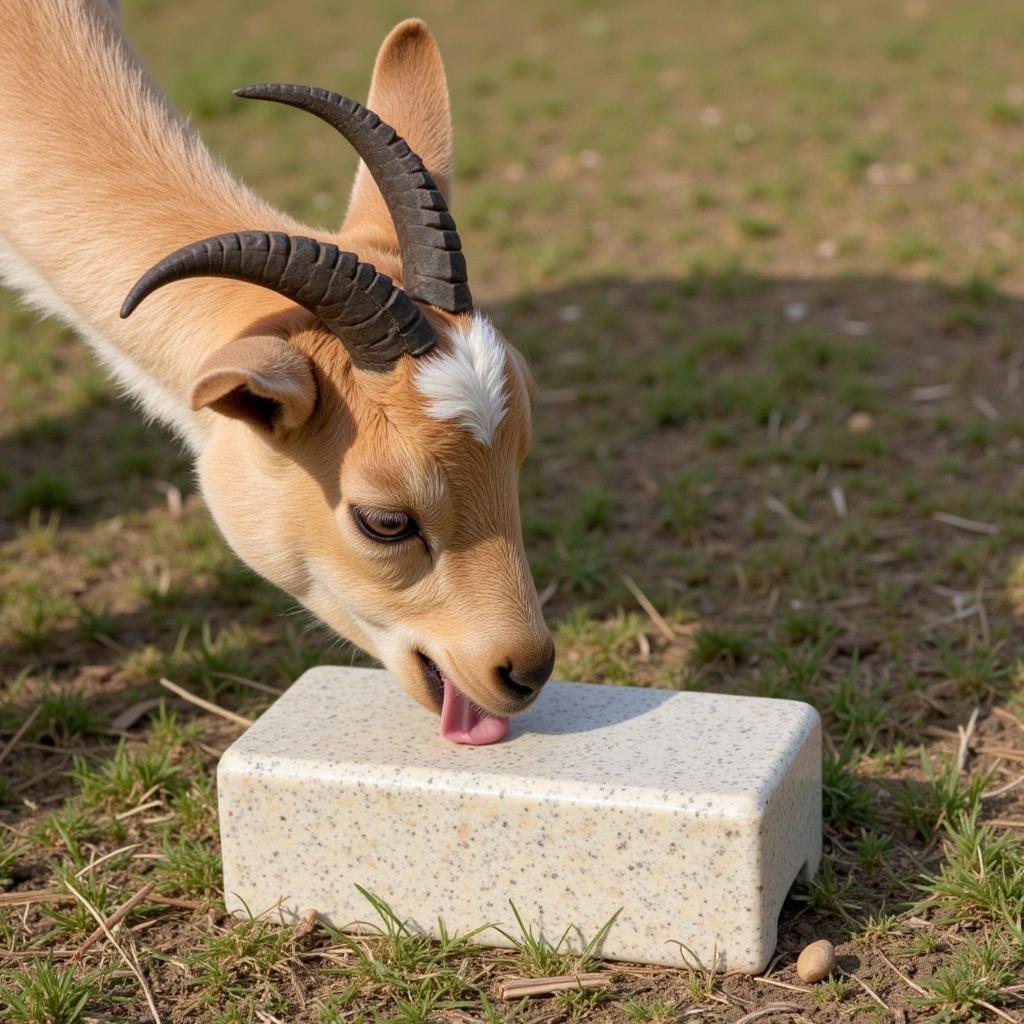Can Goats Eat Horse Feed? It’s a question many goat owners ponder, especially if they also keep horses. While goats and horses are both herbivores, their nutritional needs differ significantly. Feeding your goat horse feed might seem convenient, but it’s crucial to understand the potential implications for your goat’s health. This article will delve into the specifics of equine and caprine diets, explaining why horse feed isn’t generally recommended for goats and offering safer alternatives.
Understanding the Differences Between Goat and Horse Diets
Goats are browsers, naturally preferring to nibble on a variety of plants, shrubs, and even tree bark. Their digestive systems are highly efficient at extracting nutrients from this diverse forage. Horses, on the other hand, are grazers, primarily consuming grass and hay. This difference in feeding habits translates to different nutritional requirements. Horse feed is formulated to meet the specific needs of horses, often containing higher levels of carbohydrates and lower levels of certain minerals and vitamins crucial for goat health. Feeding horse feed to goats can lead to nutritional imbalances and potentially serious health issues.
One key difference lies in the copper requirements. Goats have a relatively low tolerance for copper, while horse feed can sometimes contain higher levels. Excessive copper intake can cause copper toxicity in goats, leading to liver damage and other health problems. Furthermore, horse feed often lacks essential nutrients that goats require, such as selenium and vitamin E. These deficiencies can compromise the goat’s immune system and overall well-being.
What Happens if a Goat Eats Horse Feed?
While a small, occasional nibble of horse feed might not cause immediate harm, consistently feeding horse feed to goats can lead to various health issues. The high carbohydrate content can disrupt the delicate balance of the goat’s rumen, potentially leading to acidosis and digestive upset. Additionally, the mineral imbalance can cause long-term health problems.
Copper toxicity is a significant concern. Symptoms of copper toxicity can include lethargy, jaundice, and anemia. If you suspect your goat has ingested a large amount of horse feed, consult a veterinarian immediately. Early intervention is crucial in preventing irreversible liver damage.
Just as important as understanding what goats shouldn’t eat is understanding what they should eat. Providing a balanced diet is essential for maintaining your goat’s health. Check out our article on oats for a horse to learn more about equine nutrition, and how it differs from goat nutrition. This will give you a better perspective on the nutritional requirements of different species.
Safe Feeding Practices for Goats
The best diet for goats consists primarily of good quality hay, fresh browse, and a small amount of goat-specific mineral supplement. Offering a variety of forage ensures they receive a balanced intake of nutrients. Avoid feeding goats processed feeds designed for other species, including horse feed, cattle feed, and even pig feed.
If you’re looking for ways to improve your horse’s hay situation, consider exploring different horse hay feeder ideas. This might free up some space and resources that you can then dedicate to creating a more appropriate feeding setup for your goats.
 Goat Receiving Mineral Supplement
Goat Receiving Mineral Supplement
“Providing fresh, clean water is just as important as providing proper nutrition,” says Dr. Sarah Miller, DVM, a specialist in small ruminant health. “Goats need access to clean water at all times to maintain proper hydration and support their digestive system.”
Conclusion
Can goats eat horse feed? The short answer is no. While the occasional nibble might not cause immediate harm, consistently feeding horse feed to goats can lead to serious health issues due to nutritional imbalances and potential copper toxicity. Prioritize your goat’s health by providing a diet tailored to their specific needs, including good quality hay, browse, and a goat-specific mineral supplement. Remember, a healthy goat is a happy goat!
FAQs
- What are the signs of copper toxicity in goats? Lethargy, jaundice, anemia, and decreased appetite are common signs.
- What should I do if my goat accidentally eats horse feed? Monitor the goat closely and contact a veterinarian if you notice any unusual symptoms.
- Can goats eat any type of grain? While goats can eat some grains, it’s important to offer them in moderation and choose grains specifically recommended for goats.
- What are the best types of hay for goats? Alfalfa, grass hay, and orchard grass are all good options.
- Can goats have the same treats as horses? This is a complex question, and you should check our article on can goats have horse treats for a detailed answer.
- What are some good sources of browse for goats? Safe browse options include tree branches, shrubs, and certain weeds. Ensure the plants are non-toxic to goats.
- **Do goats have the same digestive system as horses? You might be surprised! Take a look at our article on do horses chew their cud to understand the differences.
For further information regarding goat and horse care, please see horse eating oats.
When you need assistance, please contact us by Phone: 0772127271, Email: [email protected] or visit our address: QGM2+WX2, Vị Trung, Vị Thuỷ, Hậu Giang, Việt Nam. We have a 24/7 customer service team.